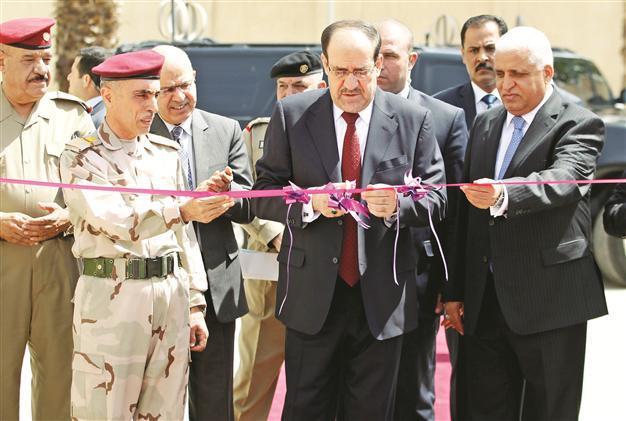Iraqi PM ‘cracks down’ on media
BAGHDAD

Iraqi Prime Minister Nouri al-Maliki cuts the ribbon during the opening ceremony of the Defense University for Military Studies inside Baghdad in this photo. An Iraqi regulatory body has ordered the closure of 44 media outlets in the country. REUTERS photo
In Iraqi regulatory body has ordered the closure of 44 media outlets in the country including the BBC and Voice of America in a dispute over broadcast licenses, sources with knowledge of the order said June 24, although no action has yet been taken.Other organizations targeted for shutdown include privately-owned local TV channels Sharqiya and Baghdadia, as well as U.S.-financed Radio Sawa. “It is an organizational matter, not a crackdown on the press,” Safaa Rabie, the head of Iraq’s Communications and Media Commission (CMC), the body responsible for the order, said. Another senior source at the body said the move had nothing to do with the way the outlets had reported on sectarian conflict in the country, as some reports have suggested.
“The CMC sent a letter warning that they were going to shut down their services because they didn’t pay [their license fees],” a senior source at the CMC told Reuters. The regulator has passed its order to the Baghdad operations command, the source added, referring to the local law enforcement forces that would carry out the closures. “This is totally wrong and unwise as it comes at a time when the country is plunged into political uncertainty,” said Ziyad al-Ajili, the head of the Journalistic Freedoms Observatory.
“We are confident that the decision is not political, but its negative implications will definitely have political implications on the government and harm the reputation of Iraq as a free country,” he added. The BBC said it was negotiating the renewal of its license with the Iraqi authorities. “The delay is due to technicalities,” it said in a statement. “The BBC’s journalists in Baghdad are not currently experiencing any issues reporting from the country, and it is important that the BBC and other international news organizations are able to operate freely and bring independent and impartial news to audiences in Iraq and the wider region.”
‘Al-Maliki must go for reforms to happen’
Iraq’s main political factions have been locked in a crisis since December, with opponents of Prime Minister Nouri al-Maliki accusing the Shiite leader of trying to consolidate power at their expense.
Powerful Shiite cleric Muqtada al-Sadr said al-Maliki needs to be removed for reforms to take place, adding that his MPs would back a no-confidence vote if necessary. “Reforms are the main goal, and withdrawing confidence precedes these reforms,” al-Sadr told reporters in the Shiite holy city of Najaf, likening the situation to the need to wash before prayers.
“We want to pray, but our prayer will not be correct unless we conduct ablutions before,” he said, according to Agence France-Presse. “The reforms cannot be implemented without putting pressure on the government. … I do not want to withdraw confidence, nor does anyone else, but our first and last request is reform and partnership, and not marginalizing the others.” Al-Sadr also reiterated that if his parliamentary bloc’s votes were needed to unseat Maliki then he would provide them.
“I said, and I am still saying, and this is a promise from my side to the other blocs, that if their votes reach 124 ... I will add to them the remaining 40 votes.” When asked about the nature of the reforms he seeks, al-Sadr referred to a list of points he presented in late April. An effort to persuade President Jalal
Talabani to call a no-confidence vote stalled earlier this month when he said al-Maliki’s opponents lacked the votes to oust him.
















